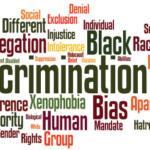How Racism Hurts Patients
Racism contributes to a range of adverse health outcomes and health inequities for minorities.1 Specifically, rates of disease and death—including earlier onset and faster progression—are higher among African Americans, Native Americans, native Hawaiians and other Pacific Islanders, and Hispanic immigrants, even after adjusting for socioeconomic status. Further, racism is associated with poorer mental health, including depression, anxiety and psychological stress, and discrimination increases the risk of hypertension among African Americans.2,3
Access to care—or lack thereof—is a significant driver of adverse outcomes among minority patients, explains Randy Vince Jr., MD, in a perspective piece published in JAMA. He recalls his own medical education, being one of five Black students in a class of 120, and listening to a professor blame tumor biology for the poorer outcomes among Black men with prostate cancer.4
“No one comes into healthcare saying, ‘I’m going to serve care with a side of racism today.’ We come in because we want to hold up the Hippocratic oath; we want to heal; we want to serve; we want to make people better; we want to be able to help to make our communities & societies better. Where we fail from oath to practice is that we do not remove barriers to systems & implement educational opportunities, so I can learn about the people who I’m serving.” —Dr. Rose
Health disparities in America cannot be explained by biology, Dr. Vince writes, citing Unequal Treatment: Confronting Racial and Ethnic Disparities in Health Care.5 The Institute of Medicine report states that racial and ethnic minorities receive lower quality of care and experience worse outcomes than white patients. These disparities remain today, as demonstrated by the COVID-19 pandemic’s disparate rates of SARS-CoV-2 infections and mortality among minority groups.6-8
Higher infection rates and other health disparities are symptoms of a bigger issue—namely, the structural factors (e.g., access to health insurance) that influence the health of the population.9 In fact, Black people and other racial minorities are less likely than white people to have insurance.10
Implicit bias also plays a role in disparate health outcomes. Everyone has implicit biases—subconscious attitudes, stereotypes and assumptions that can affect actions. Provider bias is correlated with biased treatment recommendations for Black patients and worse communication, including nonverbal cues from the provider.1,11
A striking example of health disparities in rheumatology is in systemic lupus erythematosus (SLE) and lupus nephritis, which disproportionately affect African Americans. One cohort study of nearly 21,000 individuals with end-stage renal disease (ESRD) due to lupus nephritis showed an overall decrease in mortality of 11.1 deaths per 100 patient-years to 6.7 deaths per 100 patient-years when comparing 1995–1999 with 2010–2014, but African American patients had worse outcomes than white patients in both time periods.12
One hypothesis for this disparity is socioeconomic status. Researchers looked at this correlation among more than 42,000 Medicaid patients and found mortality rates were 21% higher among Black patients and 40% higher for Native Americans than among white patients after adjusting for cardiovascular and other comorbidities.13
Patients who are discriminated against or who experience racism in their lives have worse outcomes, too. Results from the Black Women’s Experiences Living with Lupus (BeWELL) study illustrate this, showing that increasing frequency of racial discrimination was associated with greater SLE activity and organ damage.14 Further results from BeWELL show that indirect or vicarious exposure to racism—that is, hearing about or observing acts of racism or discrimination—is also associated with greater disease activity.15



